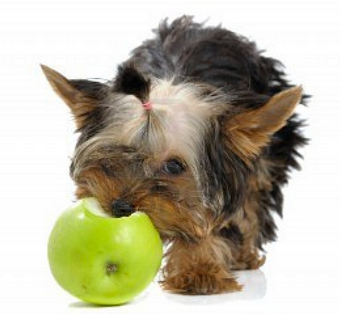Tenpawsmama often receive whatsapp messages from our lovely paw parents asking if a certain fruit is suitable for fur-balls! Hence, we have decided to write a blog post on the fruits that are suitable for our fur-balls :D

Like how veggies and fruits benefit human health, fruits and veggies are considered healthy food for fur-balls and plays an important part in prolonging their life.
Nutrient dense fruits/veggies and often orange, red and yellow ones! These fruits and veggies also contain antioxidants that reduce the risk of cancer, aids in digestion, boosts immunity, better eye sight, healthier skin and hair. However, it is best to serve organic fruits and veggies for our fur-balls as some fruits/vegs that are dyed, waxed or genetically engineered are not suitable for them!
How to feed fruits to our fur-balls:
-
Give small portions, especially the first time feeding them to your dog. Even though fruit is good for him, fruit is not calorie free. Also, you don’t know if your dog will have an allergic or other adverse reaction, such as gas or an upset stomach.
-
Clean fruit thoroughly before offering it to your dog.
-
If you can, introduce small portions of fruit to your dog when he is young. He may be more likely to try it and like it.
-
Avoid feeding your dog any type of seeds or pits. Although not all seeds are known to cause problems, it is better to be safe than sorry. What is known to be problematic or toxic are apple seeds, apricot pits, nectarine pits, plum pits, cherry pits and peach pits.

Best fruits for dogs:
- Apples: Source for potassium, fiber, phytonutrients, flavonoids, vitamin C. Note: Do not give dogs the core or the seeds, which contain arsenic. (Half of an apple slice is a good size treat.)
- Bananas: Source of potassium and carbohydrates. (1 inch is a good size treat.)
- Blackberries: Source of antioxidants (anthocyanins), polyphenols, tannin, fiber, manganese, folate, omega-3. High in vitamins C, K, A and E. (2 or 3 blackberries is a good size treat.)
- Blueberries: Source of antioxidants, selenium, zinc and iron. High in vitamins C, E, A and B complex. (2 or 3 blueberries is a good size treat.)
- Cantaloupe: Source for vitamins A, B complex, C, plus fiber, beta-carotene, potassium, magnesium, thiamine, niacin, pantothenic acid and folic acid. (1 inch of cantaloupe wedge is a good size treat.)
- Cranberries: Source for vitamin C, fiber and manganese. Helps fight against urinary tract infections, plus balances acid-base in dog’s body. (2 tablespoons of stewed cranberries added to dog’s food is good size portion. Note: To stew cranberries, put them in a saucepan with water, cover and cook until tender. Put them through a sieve and add to dog food.)
- Kiwis: Source of fiber, potassium and high in vitamin C. (A half a slice or one slice of kiwi is a good size treat.)
- Oranges: Source for fiber, potassium, calcium, folic acid, iron, flavonoids, phytonutrients, vitamins A, C, B1 and B6. (Half of a segment is a good size treat. May cause stomach upset if fed in too big a portion. Remove the rind and any seeds.) Do no feed your dog any part of the orange tree—see below.
- Pears: Source for fiber, folic acid, niacin, phosphorus, potassium, copper, pectin and vitamins A, C, E, B1 and B2. (1 or 2 pear cubes is a good size treat.)
- Pumpkin: Source for fiber, beta-carotene, alpha-carotene, zinc, iron, potassium and Vitamin A. Note: Although you can feed your dog pumpkin seeds, most recommend feeding them to dogs unsalted, roasted and then grounded. Do not feed your dog any other part of the pumpkin due to the small, sharp hairs on the pumpkin stem and leaves. (1 to 3 tablespoons of pureed pumpkin [not pumpkin pie mix] is a good size treat.) Learn more>>
- Raspberries: Source of dietary fiber, antioxidants, potassium, manganese, copper, iron, magnesium. Rich in vitamin C, K and B-complex. (2 or 3 raspberries is a good size treat.)
- Strawberries: Source for fiber, potassium, magnesium, iodine, folic acid, omega-3 fats, vitamins C, K, B1 and B6. (A half or 1 strawberry is a good size treat.)
- Watermelon: Source of vitamins C and A, potassium, magnesium and water. Do not feed your dog the seeds or rind. (1 to 3 pieces of 1-inch watermelon wedge is a good size treat.)
Fruits not suitable for dogs:
- Grapes or Raisins: They have caused many cases of poisoning when ingested by dogs.
- Avocados: They could cause gastrointestinal irritation.
- Figs: Figs have caused allergic reactions in some dogs. Also, the fig is grown on the Ficus tree (Ficus benjamina), which causes skin inflammation if your dog comes into contact with it. Ficus plants or trees also cause diarrhea and vomiting if your dog ingests them.
- Orange tree: The orange tree (Citrus sinensis) is toxic to dogs, cats and horses due to its psoralens and essential oils. You don’t want your pet to ingest the seeds, peel, leaves or stem of this tree or fruit. Symptoms of orange tree poisoning are depression, diarrhea and vomiting.
- Lemon tree: The lemon tree (Citrus limonia) is toxic to dogs, cats and horses due to its psoralens and essential oils. You don’t want your pet to ingest the seeds, peel, leaves or stem of this tree. Symptoms of lemon plant poisoning are depression, diarrhea and vomiting.
So now, you can serve fruits to your fur-balls as treats instead of feeding them commercial treats!
健康不健康,就在于你。不要懒惰!
With love,
Tenpawsmama
